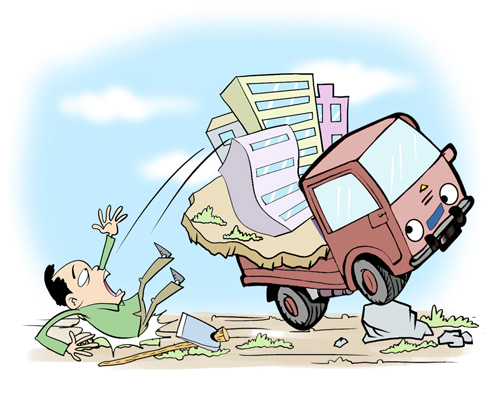China's forced urbanization puts land before people
 |
|
[ By Li Wei/China.org.cn] |
China is on the brink of a new wave of urbanization that has already gathered enormous political and economic momentum. Urban-rural integration or, to borrow the more official term, the overall planning of urban and rural development, is high on the policy agenda of China's ruling elite. The policy shift is quite natural as it is a continuation of previous efforts to solve the "three problems" of agriculture, rural areas and farmers. As the "three problems" became more serious, the Chinese government formulated a series of policies and measures, the latest being "building a new socialist countryside". But none of them have achieved the desired effect. Against this background, more and more people are returning to their former belief that only industrialization and urbanization can solve the challenges that China faces. Global trends also point in that direction.
From an economic point of view, we see that the parties concerned, especially local governments, are interested in only one issue; what is going to be the driving force for the next round of economic growth? They are looking for resources and strategies that can be mobilized to develop the economy. These include, among other things, government investment, the stimulation of investment through tax incentives, building a consumer society, etc. Judging from the experience of the past three decades, urbanization will very likely be the most powerful driving force in the next round of economic development. Although extensive fiscal investment has been pursued for many years, the building of a consumer society remains a long-term goal. Therefore, for governments at various levels, urbanization is the most "secure, effective and convenient" way to drive local economies.
As China's industrialization accelerates, large numbers of farmers are moving off the land, speeding up the pace of urbanization. The process should take place naturally. But recent tendencies have been quite disturbing. Many localities are experiencing forced urbanization by political or administrative fiat. Some local governments are concentrating their rural populations in townships. Others are encouraging farmers to buy houses in cities. Still others are going so far as to force college graduates from rural areas to give up their rural household registrations so that they can better implement their so-called overall planning of urban and rural development. It seems that all localities are mouthing high-sounding words like "improving the farmers' well-being". However, through careful observation, it's not difficult to find that what these local governments really care about is not the urbanization of the people, but the urbanization of the land. Local officials know only too well that only land can drive the local economy by leaps and bounds while rural people are simply burdens. They know how to choose between the valueless farmers and the valuable land. As a result, the "people-first" principle of overall planning is being replaced by the principles of "money-first" and "GDP-first".
It seems that, in China, the urbanization of land has all along been divorced from the urbanization of people. For a long time, China's urban development has been marked by a number of unique phenomena; for example, villages within cities. As cities expand, farmers living in the outskirts lose their land and some of them become very rich as a result of surging land prices. But apart from the few who get jobs in the city, most are not urbanized in any real sense. Instead they become a kind of special community in the city, idling away their days and engaging in all sorts of non-productive activities. They may be rich for the time being, but they never know what life holds in store for them tomorrow. In this sense, it can be said that the urban authorities are ignoring the urbanization of people.
 0
0 






